About Atlanta VA Health Care System Medical Center
The Atlanta VA Health Care System Medical Center offers a wide range of alcohol and drug rehab services for adults, seniors, military personnel, LGBTQ individuals, and young adults. These services include detoxification, outpatient and residential treatment, sober living homes, and aftercare support. The medical center uses a variety of therapeutic approaches, such as cognitive behavioral therapy, experiential therapy, family therapy, group therapy, and individual therapy, to help patients overcome addiction and achieve lasting recovery.
Addiction Treatment Programs
Alcohol Rehab
If you’re struggling with your alcohol use, consider an alcohol rehab in Georgia. During this program, you’ll work with professional counselors to deal with the psychological, emotional, and physical issues that alcohol misuse can cause. Over time, you’ll learn how to live without drinking long term.
Dual Diagnosis
If you have both a mental health condition and substance use disorder, you need dual diagnosis treatment in Georgia to address both issues together. A successful recovery may require counseling, peer support, and even mental health medication to help you manage your mental health symptoms and find better coping strategies.
Opioid Addiction
If your life has been negatively impacted by opioid addiction, a high-quality rehab in Georgia can help. High-quality treatment lays a foundation for sobriety and helps prevent relapses by giving you new ways of thinking, better coping skills, and a better understanding of key life skills such as emotional regulation and communication.
Adult Program
An adult program in Kentucky addresses the unique needs of adults, such as finding secure housing, building a career, and raising a family. In addition to typical detox, inpatient treatment, and outpatient care, an adult program may also teach clients about building a career, saving for retirement, parenting, and more.
LGBTQ Friendly Rehab
If you’re a member of the LGBTQ+ community struggling with substance use, consider an LGBTQ+ friendly rehab in Georgia. In LGBTQ+ friendly program, the activities, peer support, and counseling are tailored to the unique needs of the community. This may include trauma-informed care, talking about safer sex practices and healthy relationships, and more.
Military Rehab
When you attend a military rehab in Georgia, you’ll work with professionals who understand the unique challenges service members and veterans face in creating a substance-free life. Military programs may include detox, inpatient treatment, outpatient care, aftercare services, and more. They will be tailored to take into account your unique individual needs, such as dealing with PTSD, survivor’s guilt, trauma, and more.
Men's Rehab
When people join a men’s rehab in Georgia, they are able to tackle gender-specific issues while receiving treatment. Men’s programs may include detox, inpatient treatment, outpatient care, and aftercare services. They will also provide education around gender-specific concerns such as fatherhood, healthy relationships, and more.
Women's Rehab
A women’s rehab in Georgia can provide every level of care while addressing the unique needs of women. Women’s programs may include detox, inpatient treatment, outpatient care, aftercare services, and more. They will also address issues specific to women such as motherhood, being a working mother, having healthy communication, and more.
Young Adult Rehab
If you’re a young adult struggling with substance use, consider a young adult rehab program in Georgia. Young adult programs may include detox, inpatient treatment, outpatient care, aftercare services, and more.
Senior Rehab
Insurance Coverage
Private insurance
In Georgia, one of the options to pay for substance use treatment is using private insurance. Different plans have different coverage levels, so be sure to check with your insurance company for details. You may be responsible for certain costs, such as copayments and deductibles. Overall, however, private insurance makes treatment much more affordable.
Self-pay options
Paying for rehab in Georgia yourself, out of your own pocket, is known as self-pay. You can write a check, have money electronically sent to the center, or use a medical loan. Payment details may vary depending on the level of care.
Financing available
If financing options are available, they can help you afford the costs of rehab in Georgia. Financing options include payment plans, grants, scholarships, or even medical loans. These payment methods can make getting the help you need much more affordable.
Sliding scale payment assistance
How do you pay for rehab in Georgia? If you are struggling with the cost, consider a program that has a sliding scale payment plan. Centers offer detox, inpatient treatment, and outpatient care on a sliding scale basis, where you pay less based on your income and family size.
Financial aid
How do you pay for rehab in Georgia? If you qualify, consider using financial aid programs to pay for some or all of the costs of treatment. Treatment centers may offer grants or scholarships that make it easier for those who are lower-income to get the care they need. Contact the treatment center you’re interested in for details.
Military insurance
In Georgia, military insurance is one of your options when it comes to paying for rehab if you’re a veteran or service member. You may have out-of-pocket costs such as a deductible or copay, and you’ll want to look for a treatment center in-network with your insurance coverage.
Levels of Care
- 1
Detox Treatment
During detox in Georgia, you’ll be monitored as the substances leave your system. Then you can start fresh and create a new life. Rehab programs often use FDA-approved medications, nutrition, therapy, and other treatment methods to ensure detox is safe and you’re ready for the next step in treatment.
- 2
Outpatient Rehab
Outpatient treatment in Georgia can provide a great way to practice and reinforce new habits formed in residential rehab programs. There are several goals in outpatient treatment. Some sessions may be focused on education about a certain topic, while others allow clients to discuss a specific issue they face.
- 3
Aftercare Support
It’s easy to wonder what’s next after treatment, but fortunately, aftercare in Georgia can provide ongoing support. One element of aftercare that can be very helpful is peer support, where you connect with those who have been where you are.
- 4
Sober Living Homes
A key part of long-term recovery in Georgia is to have a safe, substance-free living environment, which is known as sober living. One element of sober living that can be very helpful is peer support, where you build relationships with others in recovery and learn from those who have been where you are.
- 5
Partial Hospitalization Program
Partial hospitalization programs (PHPs) in Georgia are led by professionals who provide intensive daily treatment, but you live at home or in a sober living facility outside the sessions. In a PHP, you learn the roots of substance use, get a better understanding of the long-term impact of addiction, and learn how to use healthy coping skills and a strong support network to achieve recovery.
Therapies
Cognitive Behavior Therapy
The goal of cognitive behavioral therapy (CBT) in Georgia is to address negative thinking patterns to create positive change. CBT may include role-playing to help you imagine specific situations that might trigger a negative reaction so you can practice challenging automatic thoughts and choosing a more positive response.
Experiential Therapy
Experiential therapy in Georgia involves activities that allow you to build confidence in your ability to make positive changes. You may struggle to address certain emotions or experiences in a traditional setting. Experiential therapy gives you a different environment and can help you breakthrough.
Family Therapy
Family therapy in Georgia can address conflicts in your family so your loved ones can help provide encouragement, support, and accountability as you work through substance use treatment. During family therapy, you may talk about acceptance issues, past trauma, communication problems, and more. These discussions are facilitated by a professional who brings an unbiased perspective and can promote healthy communication.
Group Therapy
Group therapy in Georgia can provide encouragement, support, and accountability as you work through substance use treatment. There are several goals in group therapy. Some sessions may be focused on education about a certain topic, while others allow clients to discuss a specific issue they face. Overall, the group members hold each other accountable and provide encouragement.
Individual Therapy
During individual therapy in Georgia, clients have a confidential environment to work through their struggles with a professional. Individual therapy is only one element of rehab treatment, along with activities, peer support, group counseling, relapse prevention, and more. Together, all these methods support you in establishing long-term recovery.
Trauma Therapy
Talking about what you’ve been through and how it impacted you is an important way to heal, and trauma-informed therapy in Georgia gives you that opportunity. Substance use treatment includes detox, inpatient treatment, and outpatient care, and trauma-informed therapy may be a part of each of these stages. The goal is to help clients acknowledge past experiences, address their feelings, and develop healthy coping mechanisms.
Accreditations
Location
Contact Atlanta VA Health Care System Medical Center
Top Drug Rehab Centers in Georgia
-
 Georgia
GeorgiaTwin Lakes Recovery Center Monroe
398 State Hwy 11 Monroe, Georgia 30655
-
 Georgia
GeorgiaSoutheast Addiction Center
3020 Holcomb Bridge Rd, Suite C Norcross, Georgia 30071
-
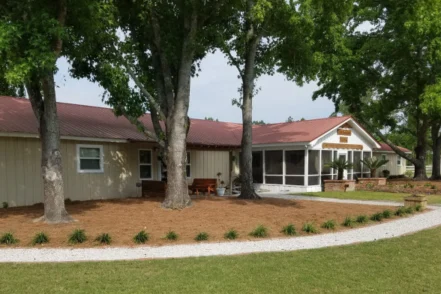 Georgia
GeorgiaBridges of Hope Homerville
1326 Antioch Church Road Homerville, Georgia 31634
-
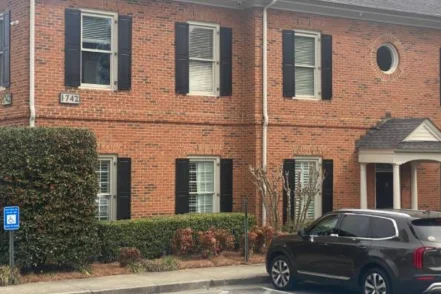 Georgia
GeorgiaAtlanta Recovery Place
1742 Mt Vernon Rd, Suite 100 Dunwoody, Georgia 30338
-
 Georgia
GeorgiaMount Sinai Dahlonega
330 Mt. Sinai Drive Dahlonega, Georgia 30533
-
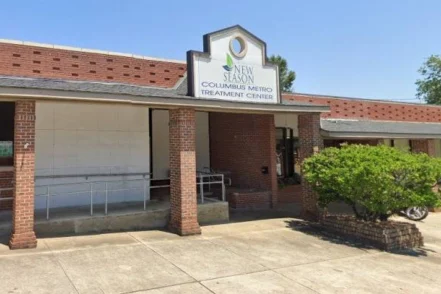 Georgia
GeorgiaNew Season Columbus Metro Treatment Center
1135 13th Street Columbus, Georgia 31901
-
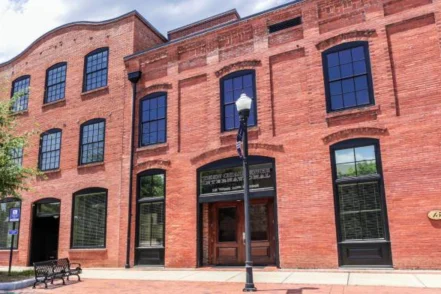 Georgia
GeorgiaTeen Challenge Southeast Region Corporate Office
15 West 10th Street Columbus, Georgia 31901
-
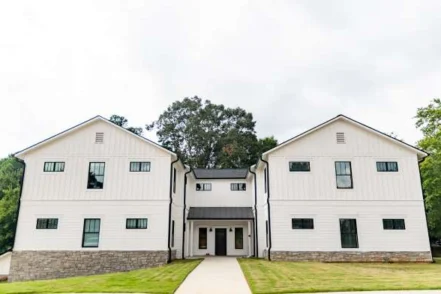 Georgia
GeorgiaNo Longer Bound
2725 Pine Grove Road Cumming, Georgia 30041
-
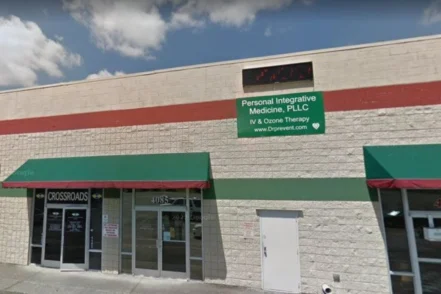 Georgia
GeorgiaCrossroads Treatment Center of Northwest Georgia
4083 Cloud Springs Road Ringgold, Georgia 30736
-
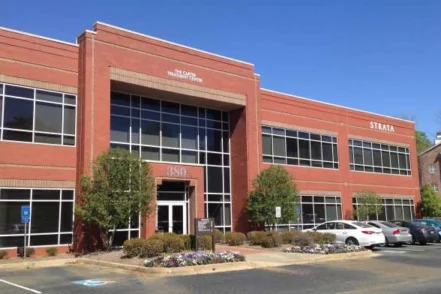 Georgia
GeorgiaThe Carter Treatment Center Cumming
380 Dahlonega, Suite 100 Cumming, Georgia 30040
-
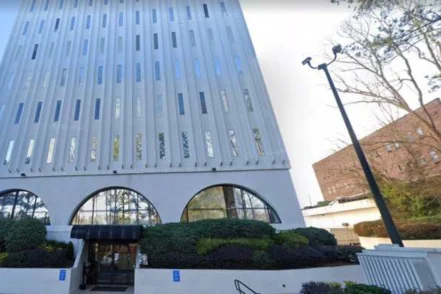 Georgia
GeorgiaSober Living America
2530 Peachwood Circle Ne Atlanta, Georgia 30345
-
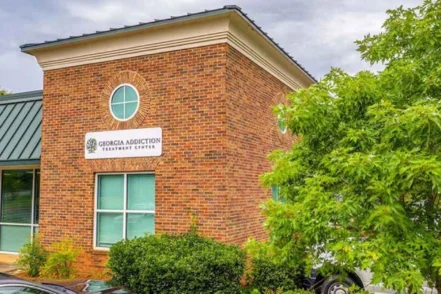 Georgia
GeorgiaGeorgia Addiction Treatment Center
100 Governors Trace, Suite 109-110 Peachtree City, Georgia 30269
-
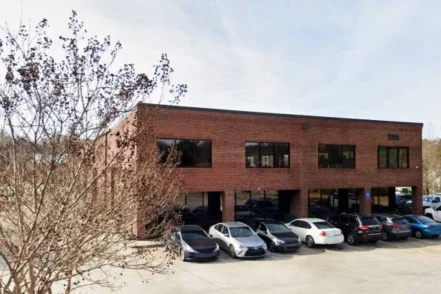 Georgia
GeorgiaBlue Ridge Mountain Recovery Center
255 Depot Street, Suite 200 Ball Ground, Georgia 30107
-
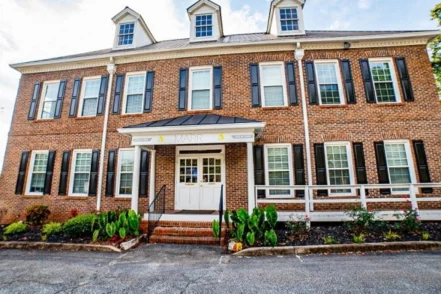 Georgia
GeorgiaMARR Addiction Treatment Centers
2815 Clearview Place Atlanta, Georgia 30340


